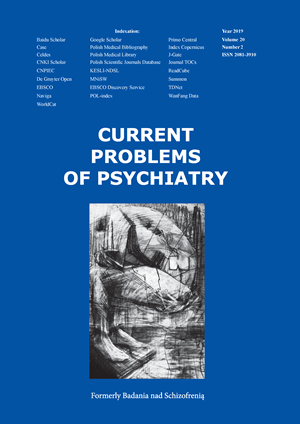Kleptomania in a 15-year-old boy with ADHD – a case report
DOI:
https://doi.org/10.2478/cpp-2019-0009Keywords:
kleptomania, impulse control disorders, psychotherapy, methylphenidateAbstract
Aim: The aim of the study was to report the case of a 15-year-old boy who developed kleptomania symptoms during methylphenidate treatment and to review the available therapeutic options for kleptomania based on a literature search of Medline and Google Scholar databases (2000-2018).
Case report: For the past seven years a 15-year-old boy had participated in counselling at a psychological counselling centre because of school problems and upbringing difficulties, and had a five-year history of psychiatric treatment for ADHD. He was admitted to the Department of Psychiatry because of recurrent stealing episodes that occurred during methylphenidate treatment. During the hospitalization, the patient did not observe the therapeutic contract – he stole items from other patients. Pharmacotheraputic and psychotherapeutic treatment resulted in a partial improvement in impulsive behaviour. At discharge, he spoke critically of his previous conduct and expressed readiness to continue treatment in an outpatient setting.
Conclusions:
- Kleptomania has a very negative impact on a patient's overall well-being.
- In the reported case, kleptomania developed during methylphenidate treatment.
- Kleptomania should always be taken into account as a possible cause of stealing during a psychiatric examination, to avoid stigmatization of patients as criminals.
- Pharmacotherapy and cognitive-behavioural psychotherapy focused on the development of strategies, which can help the patient to control the urge to steal, are important components of kleptomania treatment.
References
1. World Health Organization (WHO). The ICD -10 Classification of Mental and Behavioural Disorders: Clinical Descriptions and Diagnostic Guidelines. Geneva 1992: World Health Organization.
2. ICD 11. [online]: https://icd.who.int/browse11/l-m/en#/http://id.who.int/icd/entity/804604349
3. Sipowicz J, Kujawski R: Kleptomania czy kradzież pospolita – trudności diagnostyczno-orzecznicze. Psychiatr. Pol. 2018;52(1): 81-92.
4. Grant JE, Levine L, Kim D, Potenza MN: Impulse control disorders in adult psychiatric inpatients. Am J Psychiatry. 2005;162: 2184-2188.
5. Hässler F: Aufgehbene Schuldfähigkeit im Falle einer Kleptomanie. XII Polsko-niemiecka konferencja naukowoszkoleniowa z psychiatrii sądowej. Kraków, 4-5.09.2015.
6. American Psychiatric Association. Diagnostic And Statistical Manual of Mental Disorder. 5th edition (DSM-5). American Psychiatric Association, Washington 2013.
7. Grant JE, Odlaug BL: Kleptomania: Clinical characteristics and treatment. Rev. Bras. Psiquiatr. 2008; 30 (Suppl. 1): 11-15.
8. Guerdjikova AI, McElroy SL: Kleptomania. The Encyclopedia of Clinical Psychology. 23.01.2005.
9. Krasowicz-Kupis G, Wiejak K: Skala inteligencji Wechslera dla dzieci (WISC-R) w praktyce psychologicznej. Warszawa. 2008 Wydawnictwo naukowe PWN.
10. Grant JE: Understanding and Treating Kleptomania: New Models and New Treatments. Isr J Psychiatry Relat Sci 2006 Vol 43 No.2 81-87.
11. Lepkifker E, Dannon PN, Ziv R, Iancu I, Horesh N, Kotler M: The treatment of kleptomania with serotonin reuptake inhibitors. Clin Neuropharmacol. 1999 Jan-Feb; 22(1): 40-3.
12. Kraus JE: Treatment of kleptomania with paroxetine. J Clin Psychiatry. 1999 Nov; 60(11): 793.
13. Chong SA, Low BL: Treatment of kleptomania with fluvoxamine. Acta Psychiatr. Scand. 1996; 93. 314-315.
14. Kindler S, Dannon P, Iancu I, Horesh N, Kotler M: Emergence of kleptomania during treatment for depression with serotonin selective reuptake inhibitors. Clin. Neuropharmacol. 1997 Apr; 20(2): 126-9.
15. McElroy SL, Pope HG, Hudson JI, Keck PE, Jr., White KL.: Kleptomania: A report of 20 cases. Am J Psychiatry 1991; 148: 652-657.
16. Grant JE, Odlaug BL: Kleptomania: Clinical characteristics and treatment. Rev. Bras. Psiquiatr. 2008; 30 (Suppl. 1): 11-15.
17. Grant JE: Outcome Study of Kleptomania Patients Treated With Naltrexone: A Chart Review. Clinical Neuropharmacology. 2005; 28(1):11-14.
18. Grant JE, Kim SW, Odlaug BL: A double-blind, placebo-controlled study of the opiate antagonist, naltrexone, in the treatment of kleptomania. Biol Psychiatry. 2009; 65(7): 600-606.
19. Kohn CS: Conceptualization and treatment of kleptomania behaviors using cognitive and behavioral strategies. Int. J. Behav. Consult. Ther. 2006; 2(4): 553-559.
Downloads
Published
Issue
Section
License
Copyright (c) 2019 Authors

This work is licensed under a Creative Commons Attribution-NonCommercial-NoDerivatives 3.0 Unported License.


